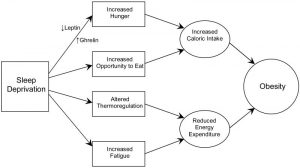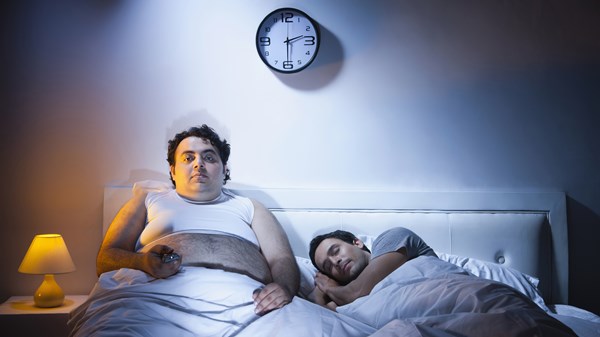Obesity is diagnosed when your body mass index (BMI) is 30 or higher. BMI is calculated by dividing your weight in kilograms by your height in meters squared. There are criticisms about BMI however, because it doesn’t measure body fat or waist-hip ratio, which are more accurate signs if someone is healthy or not. For example, it is possible for a bodybuilder to have a BMI over thirty but still have a healthy amount of body fat.
Less Sleep, More Body Fat
Published health surveys have suggested that worldwide rates of obesity have more than doubled since 1980. More than 1 in 10 individuals is obese, with numbers rising every year. The obesity crisis has been mirrored by a trend in reduced sleep. This is in part due to poor sleep quality, which leads to reduced amount of time sleeping. New research has suggested that short duration of sleep puts people at risk for obesity and its health complications. Sleep is important for modulating endocrine function and glucose metabolism, and the lack of it has been shown to decrease glucose tolerance and negatively affect appetite regulating hormones.

Early neuroscientists believed that sleep is a process for restoring the brain only, but research has proven that sleep is immensely important for the health of the entire body. In fact, some doctors and health professionals believe for people struggling with weight loss, the first thing they should fix is their sleep habits – before their diet and exercise.
Society Doesn’t Help
In the modern era we live in, societal pressures make it difficult to get adequate sleep. We live in a 24-hour world with increasing late-night work pressures and more activities to do late at night. Couple that with staring at TV and cellphone screens late into the night, circadian rhythm goes haywire. And think about it – what do you crave late at night when you can’t sleep? Probably some sweet and starchy foods.
This new era we live in is drastically different than even a few hundred years ago. People didn’t have any electricity, let alone TVs and phones, so there wasn’t anything to do in the dark but sleep. Humans evolved for millions of years on this regular biological clock, so it makes sense that our bodies find it hard to reestablish equilibrium when we break that evolutionary trend. Interestingly, if someone is finding difficulty establishing a regular sleeping pattern, sleeping in the wilderness with no source of electricity will always bring the person back on track, as they will rise and fall with the sun.
Research Studies
A particular research study found a 6% increase in the probability of obesity in over 50,000 United States adults with an age range from 18-85 for persons sleeping less than 7 hours per night. Additionally, people who worked longer hours had a higher BMI, presumably because they were sleeping less.
Another research study in Italy found that among 1600 adults, every additional hour of sleep decreased obesity by 30%. Additionally, in published studies, it has been found that younger people rather than older people are at a higher risk for obesity when sleep time is under 7 hours per night.
How Much Sleep is Right?
Some people say 8 hours is the perfect amount for everyone, other people say it’s 7, some people say 9 hours is too much… So what is actually the right amount? The answer is that there is not a “right” amount of sleep for every person. Most people know that babies need much more than 8 hours of sleep per night, and young children need much more as well. Researchers have even suggested that most teenagers should be getting 10 hours of sleep per night. For adults, 8 hours is usually a safe number, but some people need more, and some need less. Anywhere from 7-9 hours is a safe range for people to experiment and find out their specific sleep needs. Personally, I function best at between 9-10 hours of sleep, but that amount is difficult to attain on a nightly basis.
Sources:
https://www.ncbi.nlm.nih.gov/pmc/articles/PMC3632337/
https://dallas-sleep.com/dallas-sleep-blog/sleep-helps-you-lose-weight/sleep-deprivation-and-obesity-chart/
https://www.ozy.com/fast-forward/the-lastest-rx-for-obesity-sleep-off-the-fat/64884
